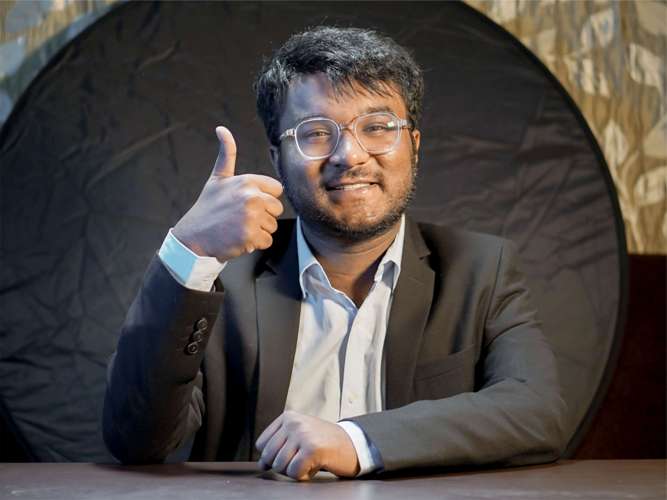Tell our readers about who is this young mind Mr. Neelakantha Bhanu and your venture – Bhanzu
Neelakantha Bhanu is a 22-year-old from Hyderabad, Telangana who is the World’s Fastest Human Calculator. He is also first Indian (and first Asian) to win Gold at the Mind Sports Olympiad in 2020. Bhanu recently featured in Forbes Asia 30 under 30 class of 2022.
He broke 4 world records and 50 Limca Book Records to become the Fastest Human Calculator in the World. In some of Bhanu’s attempts it was seen that his mind processes numbers at an average speed of 12 numbers per second, roughly 10-times faster than an average brain.
Bhanu has founded Bhanzu – a math edtech startup which works towards eradicating global math phobia and change the way students perceive math for a better world. Bhanzu provides experiential maths learning courses online for children from 5 – 16 years. The startup raised its seed round of $2 million led by Lightspeed Venture Partners in February 2022.
We would like to know about the fastest human calculator record that you broke.
The record itself is called the ‘Fastest Human Calculator’ record and it works by taking any two-digit number and repeatedly adding it to itself in 15 seconds. The highest number of times one can do it within this time limit is the record.
The reason why it is called the Fastest Human Calculator Record is because it is an attempt to race past the calculator.
An interesting fact is that the requirement to tell the answers out loud slows me down. I could go much farther if I did not have this physical limitation.
I believe that being the World’s fastest human calculator means to be at the helm of mental athletics. There are many who question the point of mental maths, however nobody questions Usain Bolt when he breaks records in sprinting when you could travel the same distance much faster with a car.
Please tell us, apart from doing this difficult calculation, what you prefer to do as a hobby during your free time.
Most of my time goes into working. My Bhanzu family has grown to 300+ and we are working extensively to provide a fun interactive learning experience to all students, developing tech infrastructure, business development and setting up processes across various verticals.
However, when I do get free time, play video games, travel and watch movies.
Tell us about your speed math techniques and how they can help you with your work.
Being a CEO means I have to always consider multiple factors to make decisions. With such responsibilities, I should not take any decisions unilaterally or with a binary mindset. Since I have practiced speed math for a very long time, I do see that it has reflected in my thinking and the way I operate.
So, today while taking a decision in business, it does help to factor in multiple things at the same time because you’ve been trained in speed mathematics and all this methodologies through which I have trained myself in gives me the ability to factor in multiple factors while taking a decision.
As speed mathematics and practice expands the working memory, it has expanded my working memory which helps me quantify the unquantifiable and make better decisions.
I think these are places where it helps and also it helps a lot in guesstimating and understanding the market in a much better way.
Help us understand how and why edtech startups have recently emerged.
Traditionally, education was restricted to geographical boundaries. However, due to the emergence of the accessible internet, edtechs found a way to scale and grow the online learning channels. That caused a boom in the EdTech industry.
However, I think Edtechs have restricted themselves by just bridging the supply-demand gap. What we’re trying to do at Bhanzu is introduce a pedagogy-driven approach. We don’t just want children to learn maths to ace exams but to develop a strong foundation.
I have always enjoyed learning math as much as any child loves sports and I’ve wanted every child to experience math the same way. So, for children who have had bad experience with maths learning, I’d want them to experience a thought-through curriculum that doesn’t teach maths using a rigid and ‘one size fits all’ approach.
I strongly believe that pedagogy driven edtechs are the future in this sector.
Thoughts on why India is regarded as the world’s education and technology hub.
In general, Indian parents are huge proponents of good education for their children and want quality education for their children. I think our previous generation emphasised on this and as a result the India we see today is aspirational. As a result, when these children grow up, they tend to be career-oriented.
This wave has resulted in a new generation of problem solvers. Today the world needs problem solvers and India is leading in this.
This interview was authored by Vishwasjeet Singh, Editor-in-Chief, Estrade Business News. To share more stories kindly email: vishwasjeet@estrade.in






